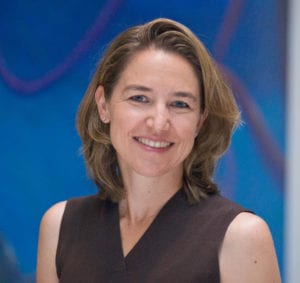
Each month, the editors of The American Journal of Human Genetics interview an author of a recently published paper. This month, we check in with Heather Mefford to discuss her paper, “Biallelic loss-of-function variants in NUP188 cause a recognizable syndrome characterized by neurologic, ocular and cardiac abnormalities”.
Posted By: Sarah Ratzel, PhD, Science Editor, AJHG
1. What caused you to start working on this project?
Like many gene discovery projects, this story started with a clinical case. Over 10 years ago, I was asked to see a newborn with multiple congenital anomalies, including an extra digit, congenital cataracts, a heart defect, and agenesis of the corpus callosum. Given the combination of features, I was convinced there must be an underlying genetic etiology, but there was no clear answer after sending many different genetic tests over several months. I am only on call a handful of weeks each year, but I happened to be the geneticist on call two years later when the same couple delivered their second baby, who was also affected. Of course, now I knew it must be genetic, and I was determined to find the answer.
By this time, exome sequencing was just being established as an effective way to identify previously unknown causes of Mendelian disorders, primarily in the research setting. We enrolled the family in a research study, and I’m pretty sure this was the first family that I sent for research exome sequencing. We had some interesting candidate genes – including NUP188 – from the analysis, so we started the search for similar cases. No luck. When GeneMatcher was created, we submitted our candidates and wait patiently for a match – very patiently. It took several years, but we finally connect with one, then two, then three other groups who had very similar cases with recessive variants in NUP188.
2. What about this paper most excites you?
I love the process of gene discovery, so finding a novel cause for a rare syndrome is always exciting. The biology is also quite intriguing. There are only a few conditions that are due to pathogenic variants in nucleoporin genes, and we can now add this condition to the list, though there’s a bit of work left to do to figure out exactly why loss of NUP188 causes this constellation of features.
3. Thinking about the bigger picture, what implications do you see from this work for the larger human genetics community?
Surprisingly, the first two families identified (ours and the first hit on GeneMatcher) each had the same two compound heterozygous variants. They were not related, but both of Ashkenazi Jewish heritage, and their variants are (so far) found only in the Ashkenazi population, both in gnomAD and in our extended studies. As a result, these variants may be added to carrier screening tests in the future. In addition, although this appears to be a very rare condition in the population, for each family the recurrence risk is high. We can’t forget that it’s important to continue to understand the genetics of rare disorders to improve our ability to diagnose, counsel, and someday treat ALL individuals with genetic conditions.
4. What advice do you have for trainees/young scientists?
Don’t give up! This project sat on the backburner for a long time, but I was certain we would eventually be successful. Persistence and patience paid off. When you’re doing something that you love (for me, gene discovery) and something that inspires you (helping the families I see in clinic or hospital), you will find a way to be successful in what you do.
5. And for fun, tell us something about your life outside of the lab.
Well, right now (due to COVID) it’s a lot of family time! I have a great husband, two smart, interesting teenagers and a dog at home, and we’re making the managing some quality quarantine time. We enjoy getting outside to walk, run, and bike, and we’ve had some fun family game nights together. When not quarantined, we love to travel and explore new cultures and cuisines.
Heather Mefford, MD, Ph.D., is an assistant professor of pediatrics at the University of Washington in the Division of Genetic Medicine and attending physician at Seattle Children’s Hospital in the Medical Genetics Clinic.
